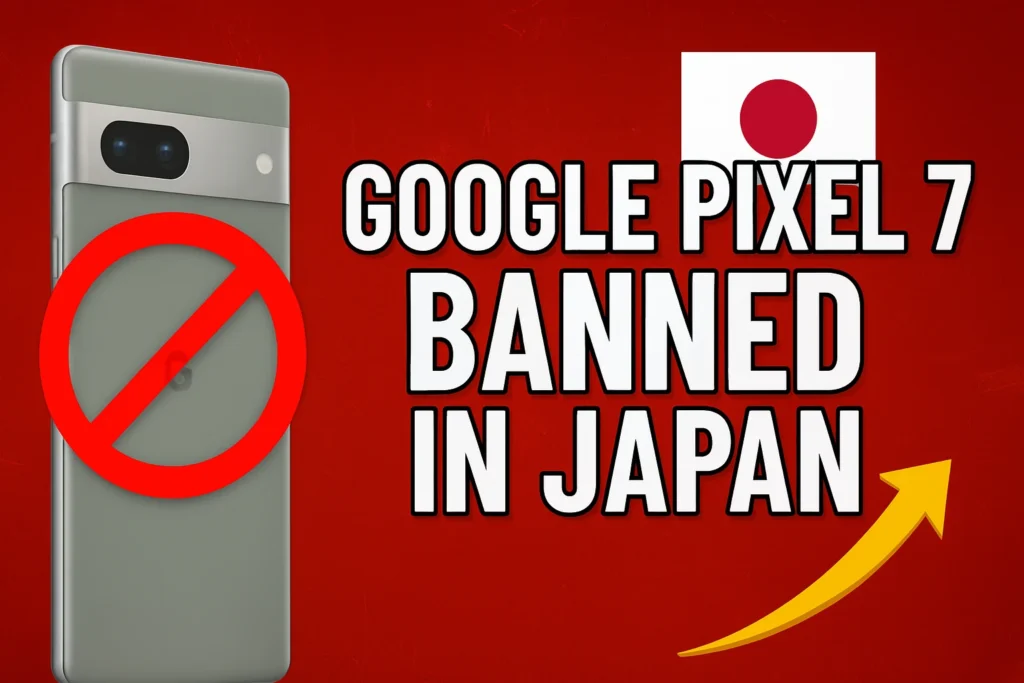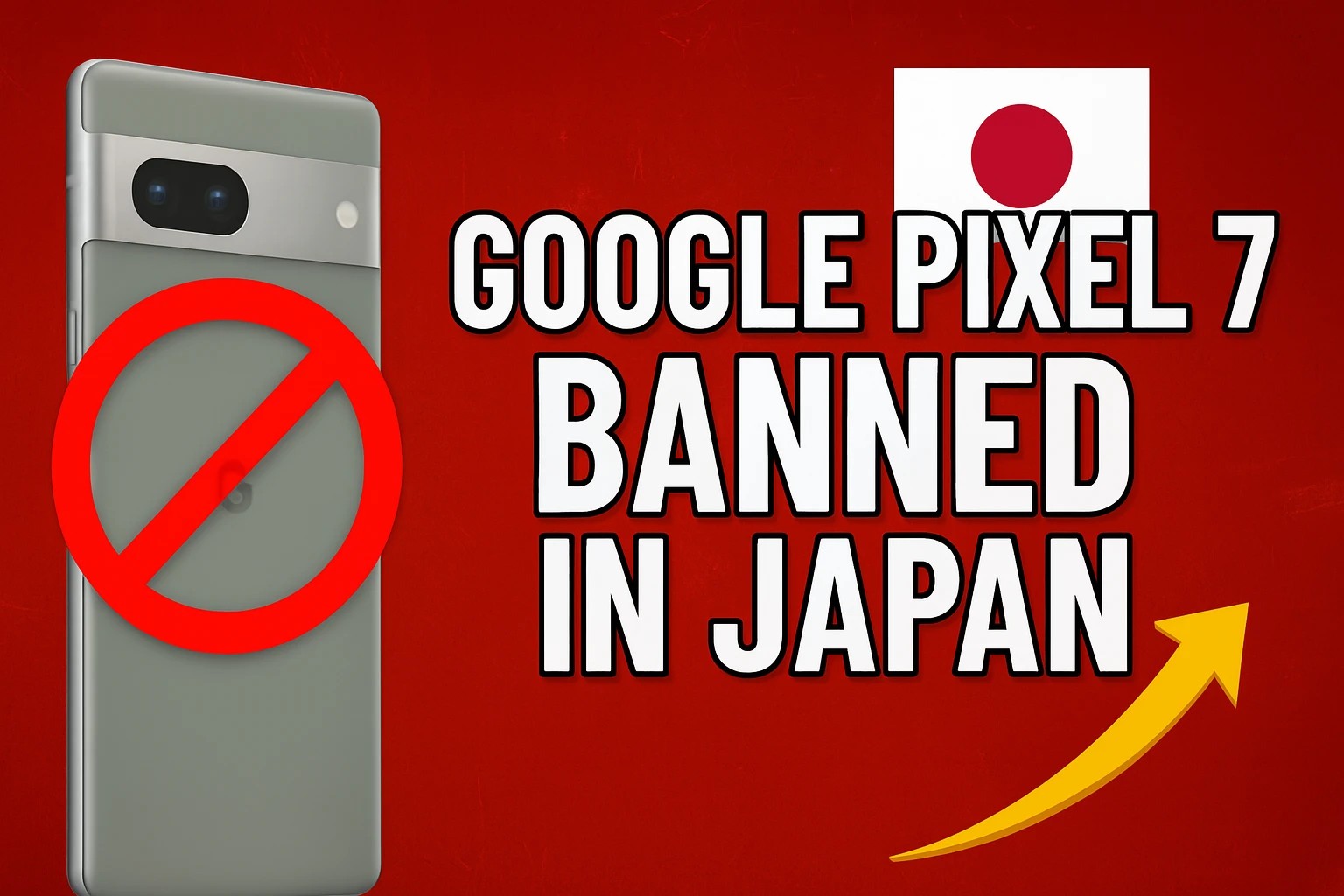In a surprising development that has stirred conversations in both the tech and legal communities, the Google Pixel 7 has been officially banned in Japan. The decision comes amid growing scrutiny around intellectual property rights and international trade compliance. While Google’s Pixel line has steadily grown in popularity across global markets, this legal blow in Japan is a setback that few anticipated.
So, what exactly led to the ban? And what does this mean for Pixel users, the Japanese smartphone market, and Google’s future in the region? This article breaks down everything you need to know about the ban, its causes, and its broader implications.
Background: Google’s Pixel Journey in Japan
Japan has been one of the key markets for Google’s Pixel smartphones in Asia. The Pixel 7, launched globally in 2022, received positive reception for its refined design, clean Android interface, and flagship-level camera features. In Japan, it stood out as a premium yet somewhat affordable alternative to Apple’s iPhones and Samsung’s Galaxy series.
However, as the device gained traction, so did concerns among certain tech companies over what they claimed were violations of key technology patents embedded in the Pixel 7’s hardware and software stack.
The Core Issue: Patent Infringement Claims
At the heart of the ban lies a patent dispute between Google and Japan-based company Maxell Ltd. Maxell, a consumer electronics and battery technology company, filed a lawsuit alleging that Google’s Pixel 7 infringes on several of its patented technologies. These patents cover functionalities related to image processing, battery optimization, and wireless communication protocols—technologies integral to any modern smartphone.
According to legal filings, Maxell claimed that Google used its patented technologies without proper licensing agreements. After months of legal examination, a Japanese court sided with Maxell, concluding that Google had indeed violated multiple patent rights.
Court Ruling and Enforcement
Following the court’s decision, the Japan Patent Office (JPO) issued a directive enforcing an import ban on the Pixel 7 and Pixel 7 Pro models. Retailers across Japan were instructed to halt sales, both online and in physical stores. Google was also ordered to cease any new shipments of the affected models into Japan.
This ruling is not retroactive, meaning existing users of the Pixel 7 can continue using their devices without issue. However, Google is now prohibited from marketing or distributing the model in Japan unless it makes substantial changes or reaches a licensing agreement with Maxell.
Google’s Response
In a brief statement following the ban, a Google spokesperson expressed disappointment with the ruling and emphasized the company’s belief in fair competition and intellectual property compliance. They also stated that the company is reviewing legal options, which may include appealing the ruling or negotiating a licensing deal.
“We respect the intellectual property rights of others and are currently evaluating the court’s decision while considering the best path forward for our users in Japan.” — Google Japan (statement excerpt)
The tech giant has not publicly disclosed whether future Pixel models will be delayed or redesigned to avoid similar issues in Japan.
Impact on Japanese Consumers
For Japanese consumers, the ban comes as an inconvenience, especially for those who were considering a purchase. Retailers like Yodobashi Camera and Bic Camera have already taken down listings of the Pixel 7 series. Online platforms, including Amazon Japan and Rakuten, are either out of stock or listing units only from third-party sellers at inflated prices.
Tech analysts suggest that the ban could push potential Pixel buyers toward competitors such as Sony Xperia, Samsung Galaxy, or Apple’s iPhone lineup. It also underscores the fragile nature of cross-border product launches, especially in a market like Japan, which is highly protective of its domestic technological innovations

Broader Implications for Google
While Japan is not Google’s largest market for smartphones, the ban sets a precedent that could have ripple effects across other regions. If similar lawsuits are filed in jurisdictions like South Korea, the European Union, or India, Google could face escalating legal and financial risks.
Moreover, this incident puts a spotlight on how crucial it is for global tech firms to ensure their devices fully comply with regional patent laws. Google, which manufactures much of its hardware through partnerships and external vendors, may need to review its supply chain and component sourcing strategy.
There’s also a reputational angle. Google has long positioned the Pixel line as a clean, reliable, and user-friendly Android experience. A patent-related ban in a country like Japan raises questions about due diligence in product development and legal compliance.
Could Future Pixel Devices Face Similar Challenges?
That’s a possibility. Patent battles in the tech industry are nothing new. Apple and Samsung famously spent years in court over design and technology patents. The Google-Maxell case is a reminder that even tech giants must be meticulous about local IP laws.
If Google plans to launch upcoming models like the Pixel 8a or Pixel 9 in Japan, it may either need to redesign specific components or negotiate preemptive licensing agreements with local firms like Maxell. Industry experts believe Google will be more cautious moving forward and may even consider expanding its in-house hardware R&D to reduce reliance on third-party tech.
What About Other Google Devices?
At present, the ruling only affects the Pixel 7 and Pixel 7 Pro smartphones. Other Google hardware, including the Pixel 6 series, Pixel 8 series, Pixel Buds, and Pixel tablets, have not been impacted by this decision—at least not yet.
However, as Maxell holds patents that may extend to other product categories, Google may need to conduct a thorough internal audit to ensure compliance across its entire ecosystem in Japan.
Conclusion
The ban on the Google Pixel 7 in Japan marks a significant turning point in the company’s global hardware strategy. Rooted in patent infringement claims by Maxell, the court’s decision highlights how intellectual property disputes can quickly escalate into full-fledged market disruptions.
For now, the ban is limited in scope but offers a powerful reminder of the complexities involved in launching and sustaining tech products in international markets. As Google assesses its legal and commercial options, both the industry and consumers will be watching closely to see how it navigates this unexpected challenge.
One thing is clear: in an increasingly interconnected tech world, compliance with local laws and respect for intellectual property are not optional—they’re essential.
